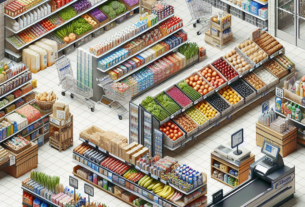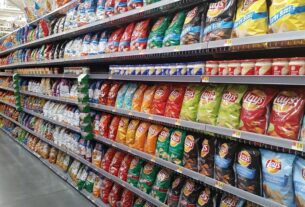The State of the Global Grocery Retail Industry in 2025
The grocery retail industry has undergone significant transformations in recent years, driven by technological advancements and changing consumer preferences. In 2025, the industry is expected to continue evolving, with a focus on smart store technologies that enhance the shopping experience for customers. Several leading grocery retail companies have already embraced these technologies to stay ahead of the competition.
Market Overview
According to a report by CulinaryCoverage.com, the global grocery retail industry is projected to reach a value of $12 trillion by 2025. This growth is fueled by increasing urbanization, rising disposable incomes, and changing lifestyles. As consumers become more tech-savvy, grocery retailers are investing in smart store technologies to improve efficiency, enhance customer service, and drive sales.
Leading Grocery Retail Companies in Smart Store Technologies
Several grocery retail companies are leading the way in adopting smart store technologies to create a seamless shopping experience for their customers. These companies are leveraging data analytics, artificial intelligence, and IoT devices to personalize the shopping experience, optimize inventory management, and streamline operations.
1. Amazon
Amazon, the e-commerce giant, has made significant strides in the grocery retail industry with its acquisition of Whole Foods Market in 2017. The company has since launched Amazon Go stores, cashier-less convenience stores that use computer vision and sensor fusion technologies to enable frictionless shopping experiences. Amazon is also investing in AI-powered recommendations and personalized offers to enhance customer engagement.
Financial Data
In 2024, Amazon reported a revenue of $555 billion, with its grocery retail segment accounting for 15% of total sales. The company’s investment in smart store technologies has enabled it to capture a significant market share and drive growth in the grocery retail sector.
2. Walmart
Walmart, the world’s largest retailer, has been investing heavily in smart store technologies to improve its operational efficiency and customer experience. The company has deployed robots in its stores to automate tasks such as inventory management and shelf restocking. Walmart is also using data analytics to optimize product placement and pricing strategies.
Market Share
Walmart currently holds a 20% market share in the global grocery retail industry, with its smart store initiatives contributing to its competitive advantage. The company’s focus on leveraging technology to drive innovation has enabled it to stay ahead of the curve in a rapidly evolving industry.
3. Alibaba
Alibaba, the Chinese e-commerce giant, has been expanding its presence in the grocery retail sector through its Freshippo stores. These futuristic supermarkets leverage AI-powered algorithms to offer personalized recommendations, optimize supply chain management, and enable seamless checkout experiences. Alibaba is also experimenting with cashier-less stores and drone delivery services to cater to changing consumer preferences.
Future Plans
Alibaba plans to open 2,000 Freshippo stores globally by 2027, with a focus on integrating smart store technologies to enhance the overall shopping experience. The company aims to leverage data analytics and AI to drive growth and increase customer loyalty in a competitive market environment.
4. Kroger
Kroger, one of the largest grocery retailers in the US, has been investing in smart store technologies to drive operational efficiency and improve customer satisfaction. The company has implemented IoT devices and sensors in its stores to track inventory levels in real-time and optimize product availability. Kroger is also using predictive analytics to forecast customer demand and personalize marketing campaigns.
Volumes
Kroger operates over 2,700 stores nationwide and serves millions of customers each year. The company’s focus on leveraging technology to enhance the shopping experience has resulted in increased foot traffic and higher sales volumes.
Conclusion
In conclusion, several leading grocery retail companies are at the forefront of adopting smart store technologies to stay competitive in a rapidly evolving industry. These companies are leveraging data analytics, AI, and IoT devices to enhance operational efficiency, drive sales, and improve customer satisfaction. As the industry continues to evolve, it is essential for grocery retailers to embrace innovation and invest in smart store technologies to meet the changing needs of consumers.


